Share This
Album at a Glance
Tags
Related Posts
- Music from America & Abroad for Oboe, Bassoon & Piano / John Dee, oboe; Timothy McGovern, bassoon; Cara Chowning, piano
- Joanna Wallfisch: The Origin of Adjustable Things
- Carl Czerny (1791-1857): String Quartets / Sheridan Ensemble
- Franz Anton Hoffmeister (1754-1812): Sonatas for piano, Vol. 1 / Biliana Tzinlikova, piano
Antonio Soler: Keyboard Sonatas Nos. 42-56 / Mateusz Borowiak, piano
Posted by Paul Ballyk on Mar 16, 2015 in Classical | 0 comments
Between 1997 and 2006, Naxos released a series of thirteen recordings performed by harpsichordist Gilbert Rowland of the complete keyboard sonatas by Antonio Soler. What's shaping up to be another cycle of Soler's sonatas began in 2011, with two key differences: one is that the performances are all on a modern grand piano, and secondly, each of the four issues to date is performed by a different pianist. One thing each musician has in common is that he or she took First Prize at the Canals International Music Competition of Barcelona. I've not heard the previous three releases, but if this one performed by Mateusz Borowiak is an exemplar of the lot, pianophiles will want to take notice.
Soler's sonatas may not be a paradigm of originality. He was a student of the great Bach contemporary, Domenico Scarlatti, whose 555 keyboard sonatas are among the towering achievements of Western music. Like Scarlatti's, Soler's 150 keyboard sonatas represent his most important work, and exhibit many stylistic features that defined the unique character of Scarlatti's keyboard sonatas a generation earlier. They are largely single movement works that can be harmonically daring, often including abrupt modulations to far-flung keys with arpeggiated harmonies and peppered with rapid, repetitive figurations. The music is alive with sparkling energy and graceful lyricism.
Compared directly, Soler's sonatas may appear to lack the technical complexity, sonorous effect and passionate cascade of thematic invention found in Scarlatti's works, however they are of a later time, and should not be compared straightforwardly. Soler's sonatas are not mere cookie-cutter imitations of Scarlatti's, but are the product of a composer influenced both by what came before and by the winds of change coming from pre-classical Vienna. The formal clarity and simpler methods of Soler's sonatas are certainly by design, and are integral elements of this immensely satisfying music.
These sonatas are rather scarcely represented on disc, especially in performances on a modern grand piano. Mateusz Borowiak's polished performances and Naxos's demonstration class engineering combine to illuminate this important body of piano works from the early classical period.
Although Soler wrote for the church, it is his secular compositions, in particular his keyboard sonatas, that are his best-known achievement. Most were written for Don Gabriel, son of King Carlos III, and they show how adeptly Soler had absorbed the influence of Domenico Scarlatti but also listened to the changing musical styles emanating from Vienna. The result is music of brilliance, full of unexpected modulations, rapid figuration, and graceful charm. This is volume 4 of the complete Soler Keyboard Sonatas.
Source: Naxos
 Antonio Soler |
Antonio Soler, composer Antonio Francisco Javier José Soler Ramos, usually known as Padre (‘Father’, in the religious sense) Antonio Soler, (baptized 3 December 1729, died 20 December 1783) was a Spanish composer whose works span the late Baroque and early Classical music eras. He is best known for his keyboard sonatas, an important contribution to the harpsichord, fortepiano and organ repertoire. Soler was born in Olot (Catalonia, Spain) in the historical County of Besalú. In 1736, when he was six, he entered the Escolania of the Monastery of Montserrat where he studied music with the resident maestro Benito Esteve and organist Benito Valls. In 1744, he was simultaneously appointed organist and subdeacon at the Cathedral of La Seu d’Urgell. Later in life, he was chapel master in Lleida and at the Royal Court in El Escorial. Padre Soler’s most celebrated works are his keyboard sonatas, which are stylistically comparable to those composed by Domenico Scarlatti (with whom he may have studied). However, Soler’s works are more varied in form than those of Scarlatti, with some pieces in three or four movements; Scarlatti’s pieces are in one or two movements. Soler’s sonatas were catalogued in the early twentieth century by Fr. Samuel Rubio and so all have ‘R’ numbers assigned. Soler also composed concertos, quintets for organ and strings, motets, masses and pieces for solo organ. He also wrote a treatise, Llave de la modulación (“The Key to Modulation”, 1762). Soler’s Six Concertos for Two Organs are still very much in the repertoire and have been often recorded. A fandango once attributed to Soler, and probably more often performed than any other work of his, is now thought by some to be of doubtful authorship. |
|
Mateusz Borowiak |
Mateusz Borowiak, piano Mateusz Borowiak is a graduate of Cambridge University and the Karol Szymanowski Academy of Music in Katowice where he studied under Andrzej Jasiński. He is a recipient of several awards including third prize and the Musiq’3 Radio Audience Prize at the Queen Elisabeth Piano Competition in Brussels (2013), gold medal and first prize, prize for the youngest finalist and prize for the best performer of the music of Isaac Albéniz at the 57th Maria Canals International Piano Competition in Barcelona (2011), first prize and Audience Award at the 21st Rina Sala Gallo International Piano Competition in Monza (2010), first prize at the Yamaha Music Foundation of Europe Piano Competition (2011), the Contemporary Prize at the 19th Cleveland International Piano Competition (2011), the Harriet Cohen Memorial Award (2010), first prize for keyboard at the Royal Over-Seas League Music Competition in London (2006) and the Gawon International Music Society Award in Seoul (2014). Borowiak has performed as a soloist in major venues throughout Europe and as far afield as Beijing, and has appeared with distinguished orchestras and ensembles, collaborating with conductors of renown. Many of his concerts have been broadcast by national television and radio stations in Belgium, Hungary, Slovakia, Spain, Sweden, the United Kingdom and Poland. Source: http://www.naxos.com/person/Mateusz_Borowiak/225533.htm |
![]() About Paul Ballyk
About Paul Ballyk
all about Paul
Twitter •
| Thinking about purchasing this album?
Follow this link for more album details or to make the purchase. Buy it now |
“Not just recommended. Guaranteed.”
We stand behind every album featured on Expedition Audio. Our objective is to take the monetary risk out of music exploration. If you order this album from HBDirect.com and do not like it you can return it for a refund.
Antonio Soler: Fandango for Harpsichord





